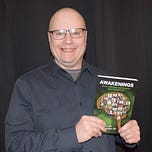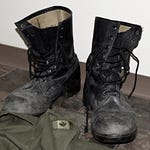
Medications. Sleep. Diet. Exercise. Artistic Expression.
This podcast takes the listener on a journey, first into my own world of schizoaffective disorder with anxiety and through some of the more amazing things that happened in my life. I had some good times growing up, spending a whole month with my dear brother and my dad in Denmark, touring the country in my Uncle’s Volvo. I also had a month-long vacation where my parents took my brother and sister and I on a trip to California. I think it is important to note that I returned to California at 19 after I had been diagnosed with a mental illness, but I wasn’t on my medications. This trip very nearly ended in disaster, though still I have some great memories of it.
One of the first things I wanted to do with this podcast was to talk about psychosis and some of the treatments for it. Often, when a person experiences psychosis, they will be involuntarily admitted to the hospital. When this happens, the doctors, nurses and other staff know very little about the person’s situation and will overmedicate them. I don’t know if drugs are still used like the ones I used to get, but when I was 18 and first was sent to the psychiatric hospital, they would punish any bad behavior with an injection of medication that would kill a horse. The worst part of it was how it paralysed a person, I recall the medication a few seperate times causing my neck to seize up and bend down to one side. Perhaps what I found to be most cruel was that the staff would all get together and gang up on you, administer the shot, then leave you to drool as you were completely unable to react, speak or move.
Most modern hospitals and doctors don’t use such methods, but often when you are first admitted to a hospital you will be put on a lot of drugs. I wish I had more advice on how to help someone cope with a negative hospital stay, but really the best you can do is watch TV without complaining that you don’t like what is on, or reading a book if you are able to concentrate enough. There were times during my last hospital visit where I would have a book or magazine, and just read a few lines or one article and then pace around until I was too tired for restlessness to bother me and then sit and read a little more. I can’t imagine what it would be like in an overcrowded state hospital or county jail system having a mental illness.
Something that I have always found critical to surviving a bad hospital stay is to have a buddy. One person who you can talk to, be friends with and anything that friends do together from card games to rolling cigarettes. It is important to note that most hospitals discourage people from meeting up outside of the hospital after their discharge. This may seem unfair, but I asked a nurse once about it and she said many times people had left the hospital, taken in someone who seemed nice that they met in the hospital, and the person took them for all the cash in their bank account. Unfortunately, when this happens, the hospital is totally bound by confidentiality laws to tell even the police anything about the person. Many other incidents occur. I met a young woman in the hospital once and we had sort of a romantic relationship for a short time, and then one day she seemed angry and after a couple of days she blew up and accused me of stealing her life story (I had given her a copy of my first memoir to read). I was so worried she was going to get a lawyer or churn up trouble that I sat down over the next three weeks and completely rewrote my book.
Now, what I wanted to get across above all in this podcast and accompanying blog, is that in order to fully recover from a mental illness, many things have to come together. Proper medication is probably the most important part. I should caution people here that, though I mentioned as time goes on, you will be put on a lower dose of medications you were given when first admitted, it is important to let your doctor set the therapeutic dose for many reasons.
One reason I know of is that a roommate of mine in a group home was very proud of himself that he was able to convince his doctor to keep lowering his antipsychotic, but in the end he became very ill and his illness took a big chunk of his life away from him. Another thing is that in my own case, years ago, I was taking 4 pills a day of one drug and thought it would be fine if I just lowered the dose a bit, not realizing that this medication had to be at a certain level in my blood for it to be effective at all. By lowering it I made it useless, and when someone from the hospital went to get things from my apartment, they saw all the extra meds I hadn’t taken and told the doctor I had gone off all of my meds. This caused a great deal of confusion and made for a lengthy hospital stay
Sleep is the next key factor. People on psychiatric medications often sleep a lot. However, there are medications that can help you wake up and have a more productive day. I only know of a couple that are available in the US, but this is an excellent thing to bring up with your doctor if you find yourself too drowsy to function.
Exercise is the next important thing to continuing your recovery journey. It can be just a walk. It can be a weight workout with cans of soup, books, or even a jug of milk. I use 25 pound weights and two 10 pound weights and I sleep so much better, feel so much better, and like to think look better doing just three fairly simple weight routines every second day. Swimming is also an incredible way to stay in shape. When I haven’t been to the pool in a while, I really begin to crave the feeling of being in cool water and paddling around, doing some easy laps (side crawl they cal it) or even bringing my snorkelling gear and getting face down in the silent water.
The last and perhaps most important thing I want to explain about a full recovery is artistic expression. As many of you may know, I have a hard time getting through a day without doing a lot of writing. Your own artistic expression can be different. You may play piano or violin or guitar or even harmonica. Find a way to immerse yourself in an experience where you have a way to express yourself. Get some drum sticks and a practice pad, find an old acoustic guitar online or paint, draw, sketch. Find a way to focus on something more than just your symptoms and illness, and I guarantee you will thank yourself for doing it.













Share this post